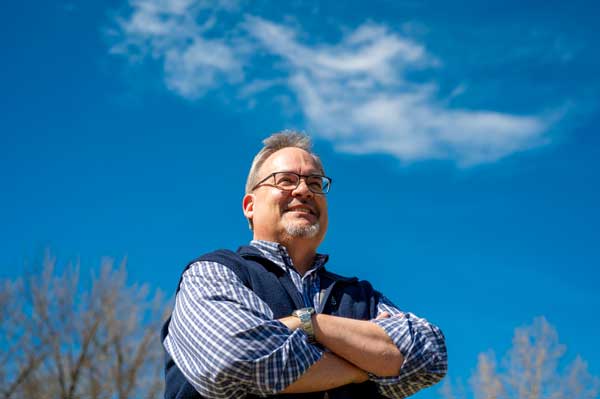Professor of Psychology Dr. Alan Eby’s fascination with weather began in middle school, when his homeroom was located in the science lab. Each morning he got to school early and recorded the temperatures at various weather stations. Three times a week he shared the weather report with the entire school during morning announcements. Eby is still known as the “weather guy” to students, faculty and staff. He often kicks off his classes with a discussion of major weather events, and a number of his colleagues in Bowman Hall stop by his office before heading home when inclement weather is forecast.
“My passion is relating to one or two people at a time and talking about how the weather may impact them on an individual basis,” Eby says.
Most mornings Eby is up by 4 a.m., watching several news channels, scrolling through various weather websites and analyzing weather models. Not only is he keeping tabs on the weather for the Bridgewater area, but he also monitors EarthCams around the country at some of the most well-known weather stations. (An Eby family vacation in summer 2022 included a visit to Mount Washington, N.H., the place where the fastest wind gust on Earth—231 mph—was recorded.)
It’s not surprising that the psychology professor and Program Director for the College’s M.S. in psychology is interested in the intersection between humans and weather. He’s interested in how geographic changes have occurred over time and points out that both geography and people are influenced by their surroundings. There are patterns to weather behavior just as there are in people.
“The whole notion of prediction is based on confidence, of past experiences, signs and indicators about the future,” Eby says. “You base your prediction on typical patterns, as long as nothing else changes. While you can talk about big patterns, there are also highly individual experiences.”
Eby takes his role as weather guru for his friends, family and colleagues seriously, although he says he would never want to be a meteorologist and has no plans for a career change. In the early part of the COVID-19 pandemic, he became certified as a National Weather Service observer for his local area.
When an infamous derecho hit Central and Southwest Virginia in 2012, Eby and his family were attending an outdoor music festival. He had tracked the line of storms all morning, starting in Chicago, and was able to shepherd his family and others to safety right before the derecho pummeled the area.
“Weather is predictable, but time is the crucial aspect,” Eby says. “The more stable the weather patterns are, the further out you can predict.”
— By Jessica Luck


